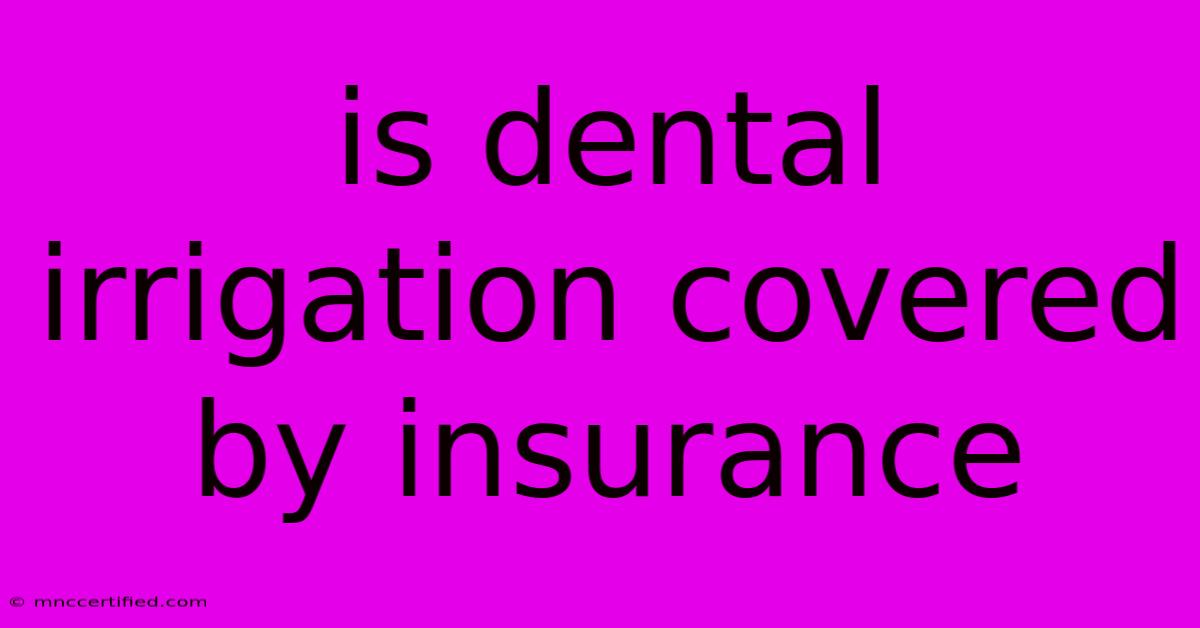Is Dental Irrigation Covered By Insurance

Table of Contents
Is Dental Irrigation Covered by Insurance? A Comprehensive Guide
Maintaining good oral hygiene is crucial for overall health, and dental irrigation can be a valuable tool in this endeavor. But many people wonder, "Is dental irrigation covered by insurance?" The answer isn't straightforward and depends on several factors.
This comprehensive guide will break down everything you need to know about insurance coverage for dental irrigation, helping you understand your options and make informed decisions about your oral health.
Understanding Dental Irrigation and its Benefits
Dental irrigation, also known as water flossing, is a method of cleaning teeth and gums using a specialized device that sprays a pulsating stream of water. This technology effectively removes food debris, plaque, and bacteria from areas traditional brushing and flossing might miss.
Key benefits of dental irrigation include:
- Improved gum health: Reduces plaque and bacteria buildup, promoting healthy gums and reducing the risk of gum disease.
- Enhanced cleaning: Effectively reaches hard-to-reach areas like the back teeth and around braces.
- Fresh breath: Helps eliminate odor-causing bacteria.
- Gentle cleaning: Suitable for individuals with sensitive teeth or gums.
Dental Insurance Coverage for Irrigation Devices
Unfortunately, dental insurance coverage for irrigation devices varies widely. Some insurance plans may cover it, while others may not. Here's what you need to consider:
- Plan type: Check your policy's coverage details. Some plans cover preventive care like dental irrigation, while others may only cover basic procedures.
- Coverage limitations: Many plans have annual or lifetime maximums on what they will cover. Be sure to check your plan's limits.
- Dental irrigator type: Coverage might depend on the type of irrigator you choose. For example, some plans may cover basic models but not advanced features.
- Specific coverage for dental hygiene: Even if your plan doesn't explicitly mention dental irrigation, it might cover other dental hygiene tools or procedures.
How to Determine Coverage
Here are some steps to determine if your insurance covers dental irrigation:
- Review your policy: Carefully read your insurance policy for specific details about covered dental hygiene tools or procedures.
- Contact your insurance provider: Reach out to your insurance provider directly to ask about coverage for dental irrigation. Be sure to clarify any specific models or features you're considering.
- Consult your dentist: Your dentist can offer guidance based on your individual needs and recommend appropriate irrigation devices. They can also assist with any questions you have regarding insurance coverage.
Tips for Maximizing Coverage
- Ask about preventive care: Many insurance plans cover preventive care, which can sometimes include dental irrigation.
- Consider a higher coverage plan: If your current plan doesn't cover dental irrigation, consider upgrading to a plan with more comprehensive coverage.
- Inquire about flexible spending accounts (FSAs): These accounts allow you to use pre-tax income to pay for medical expenses, including dental hygiene products.
Conclusion
Whether or not dental irrigation is covered by your insurance depends on your specific plan and coverage details. It's important to review your policy, contact your insurance provider, and consult your dentist for personalized guidance. By understanding your options and taking proactive steps, you can make informed decisions about your oral health and potentially maximize your insurance benefits.
Remember, a healthy smile is an investment worth making!

Thank you for visiting our website wich cover about Is Dental Irrigation Covered By Insurance. We hope the information provided has been useful to you. Feel free to contact us if you have any questions or need further assistance. See you next time and dont miss to bookmark.
Featured Posts
-
Will Trump Implement Project 2025
Nov 07, 2024
-
Bitcoins Real Time Indicator Role During Market Volatility
Nov 07, 2024
-
Project 2025 Exploring The Dystopia
Nov 07, 2024
-
Jensens Shetland Filming No Spoilers
Nov 07, 2024
-
Watch Crvena Zvezda Vs Barcelona Champions League
Nov 07, 2024